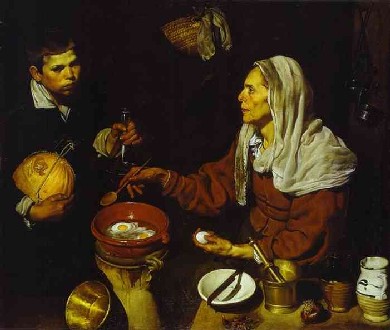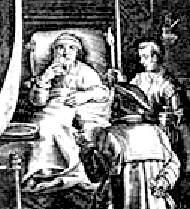
Eggs and Medicine: 1 2 3 4 Next>>
Eggs in Medicine During the Golden Age of Piracy, Page 3
Having looked at eggs in the context of shipboard life, let's examine how the surgeons during the golden age of piracy used them in medicine.
Eggs In Illness: Part of the Prescribed Diet
"...but I think, no man of common sense but knows... when a Body hath been exhausted through lots of bloud or the like, it"s reason that a greater liberty [in diet] should be allowed, as to take Broths, Jellies, new-laid Eggs, &c." (Richard Wiseman, Of Wounds, Severall Chirurgicall Treatises, p. 346)

"Old Woman Frying Eggs" by Diego Valazquez (1618)
Health care during this period in history had a very naturalistic bent. Healing was frequently left to Nature or God with the surgeon limiting himself in a role as assistant. Diet was often considered an important part of the healing process and eggs were featured in several dietary recommendations for recovering patients. William Dampier tells us that in 1681, off the Isthmus of Darien [modern day Panama] that "...we got Eggs, and such Refreshments as the Indians had, for we still provided for the Sick and Weak."1 Clearly the surgeon on Dampier's journey saw the value of eggs in the diet of the ill.
Period surgeons recommend eggs in the diet for various illnesses. Woodall gives eggs quite the boost as a healing food in his commentary on the cure of diarrhea:
"And further, if it shal appeare, that this disease have so gotten the upper hand that the patient is growen very feeble, his bloud being wasted, appoynt him a diet that may warme and comfort the stomacke, namely, at land if it may be had, Brothes of Chickings [ah, the old stand by for illnesses - chicken soup] or the like, with some spices therein, and egges and sugar, and a little rose water... and cawdels [a caudle was a hot drink made from ale or wine, thickened with egg yolks, sweetened with honey or sugar, spiced, and gently heated until the eggs thickened] with egges wine and spices, according to good discretion will doe well, if they may be had".2
Woodall also includes it in his (rather long) list of items he thought would help cure scurvy. As he suggests, " …make [the patient] some comfortable spoone meate [meat that has been liquified so that it must be eaten with a spoon], such as you can make at sea; namely, an
oatmeale caudell would not bee a misse or a little beere or wine, with the yolke of an egge, and a little sugar made warme and given him to drinke, or any comfortable broath made with currants and other fruite, or spiced

John Woodall, author of the surgions mate
moderately taken, or with sugar, or as the shippe can afford… Further the Surgeon and his Mate [assistant] must not faile to perswade the Governor or Purser in all places where they touch in the Indies and may have it, to provide themselves of juice of Oringes, limes, or Lemons, and at Banthame of Tamarinds: Also sometime though a man bee well, a comfortable caudell made with some wine, spices, sugar, and the yolke of an egge were very good; for these are helps in that case as well to prevent the disease, as also to helpe it when it comes."3 (Woodall has been given credit for being on of the early doctors to suggest edibles containing Vitamin C for curing scurvy, but as you can see here he includes it in a pretty long list. Nor is this all of the suggestions he makes for curing scurvy. For more on this, see Scurvy Treatment During the Golden Age of Piracy.)
Apparently much taken with the incredible, edible egg, Woodall also includes it in one of his favorite standbys - the glister. "[G]ive him, if thou see cause, a glister, if there be feare of excoriations in the guts, namely a decoction of Barley or Bran, or of Bran onely with [two ounces of] Deere suet let not your decoction be too slimy of the Bran, and adde if you can get it, the yolke of one egge, for egges comfort much and swage paine, the yolke of an egge must be well beaten with the decoction by little and little, so taken very warm, or if the party have gripings in his guts [stomach pain]".4 Richard Wiseman calls for clysters [enemas] for stomach wounds containing, "...Chicken or Veal broth wherein Barly hath been boiled: to which may be added Yolks of eggs, mel. comm. [mixed with honey] or Sugar of red Roses, &c."5
Woodall and Wiseman were not alone in their use for the oval edible. Ambroise Paré prescribes "rere

Taken from "Hyacum et Lues Venera"
by Theodor
Galle (1570)
[soft-boiled] egges" in the diet for patients recovering from gunshot wounds.6 He calls for "...the yolkes of Egges, and bread tosted and dipped in Sacke [fortified wine] or Muskedine [muscadines are an Italian grape that were used to make wine of the same name]" in the post-amputation diet.7 During the treatment of a patient for syphilis, John Moyle explains that his charge "lived on Chicken broth and Posit drink all this time, except now and then a poched Egg or other innocent thing".8
Perhaps the most peculiar dietary ovum recommendation comes from Stephen Bradwell, who recommends that after a victim has recovered from being nearly drowned, "...let him eate Pepper and Sugar, or Pepper and Honey, as he liketh best. He may also eate a roasted egge with pepper in it. But let him not drink at all in 24. houres at the least, & then let it be middle-Beere and white wine mixed together; of which let him him drink but 2. small draughts at a meale, and betwixt meales not at all. This Diet let him observe for a weeke together, keeping himselfe warme and moderately stirring his body immediately before, & an houre after his meate."9
1 William Dampier, Memoirs of a Buccaneer, Dampier's New Voyage Round the World, p. 20; 2 John Woodall, the surgion's mate, p. 208; 3 Ibid., p. 208-9;4 Ibid., p. 208-9; 5Richard Wiseman, Of Wounds, Severall Chirurgicall Treatises, p. 371; 6 Ambroise Paré, The Apologie and Treatise of Ambroise Paré, p. 82; 7 Ibid, p. 149; 8 John Moyle, Memoirs: Of many Extraordinary Cures, p. 98; 9 Stephen Bradwell, Helps For Suddain Accidents Endangering Life, p. 99-100

